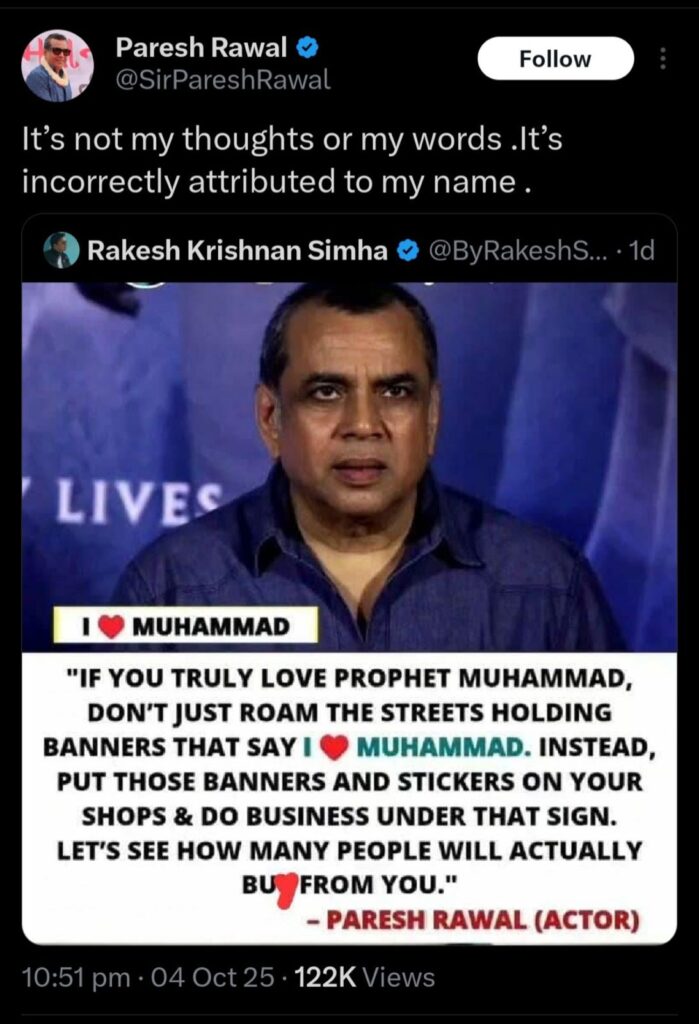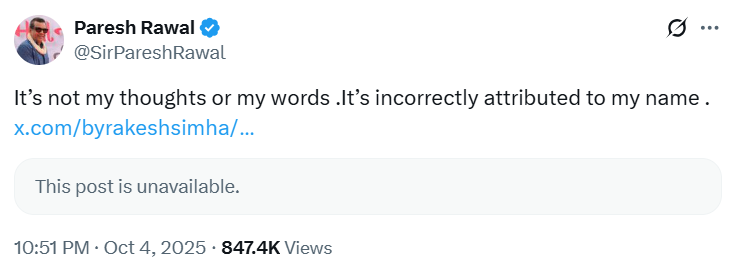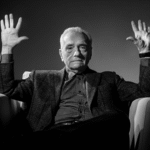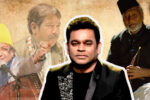Imagine this — if a senior actor like Paresh Rawal, a former Member of Parliament, can be trapped in a web of lies so easily, what about an ordinary citizen? Fake statements are being spread in his name — statements that could directly incite violence. This isn’t random; it’s a pattern: first, a lie is planted → then outrage follows → then comes boycott calls or threats → and finally, once the damage is done, the post gets deleted. This is the new-age “dogwhistling.”
Recently, a New Zealand–based so-called journalist, Rakesh Krishnan, shared a post quoting Paresh Rawal as saying:“If you truly love Prophet Muhammad, don’t just walk around with banners saying ‘I Love Muhammad’. Instead, put those banners and stickers on your shops and trade under that name — let’s see how many people buy from you.”

Paresh Rawal immediately refuted this claim on his social media handles, stating that these are not his words and do not represent his thoughts. The quote, he said, was falsely attributed to him.
That post has now been deleted — but the spark it ignited had already set fire to public sentiment.

Across parts of the country, protests have erupted under the slogan “I Love Muhammad”. Policemen have been assaulted, Hindu idols vandalized, and mobs have stormed police stations. In such a charged atmosphere, spreading fake statements — especially under someone else’s name — is nothing less than an attempt to inflame existing tensions.
And why, one must ask, are certain people’s shoulders always chosen to rest the gun on? Was Paresh Rawal an easy target because he once represented the BJP in Parliament? Or because his upcoming film “The Taj Story” recently released a motion poster showing a Shiva idol emerging from the Taj Mahal — something that predictably triggered outrage in certain circles?
Think about it — a man who never said those words in any interview, post, or tweet, suddenly finds himself being abused and accused across social media. Fake quotes are pasted alongside his photo, and a lie becomes “truth” through repetition. In today’s digital climate, it feels as if character assassination and “Sar tan se juda” are just one tweet away.
Not long ago, we wrote an article and discussed how Paresh Rawal himself had posted a disclaimer clarifying that The Taj Story is not a religious film, nor does it claim that a Shiva temple exists inside the Taj Mahal. The film, he emphasized, focuses only on historical interpretations, urging audiences not to form opinions before watching it.
But the social media mob has no time for facts — only outrage. The same left-leaning ecosystem that had earlier branded him “Sanghi,” “cow urine drinker,” and much worse during earlier controversies, has once again started its trolling engines.
Now, once again, the gun is being fired from his shoulder. Fake quotes are circulated, outrage follows, and then — post deleted.
We’ve seen this pattern before — with Anupam Kher, Kangana Ranaut, and several others. Their genuine statements are twisted, AI-generated clips are used, fake screenshots are circulated, and slowly a narrative is built — that “so-and-so” is anti-religion or anti-idea.
But this isn’t just about one lie — it’s about a systematic planting of distrust and hostility in society. When you portray someone as “anti-religion” through fabricated statements, you prepare an entire mob — one that refuses to listen to truth, because hate feels more satisfying.
Our Constitution guarantees freedom of speech, but not the freedom to lie. The issue isn’t just about Paresh Rawal’s fake quote — it’s about the ecosystem that can turn anyone into a “symbol of hate” to serve its agenda.
Paresh Rawal never said those words. But those spreading the lie believed what strengthened their bias. Instead of listening to truth, we listen to what validates our anger — and that, right there, is the first step towards violence: misinformation.
Sometimes a lie hits harder than the truth — because we’re already ready to believe it. That’s exactly why we must stay alert, question every viral post, and remember — outrage built on lies destroys more than reputations. It destroys reason itself.









